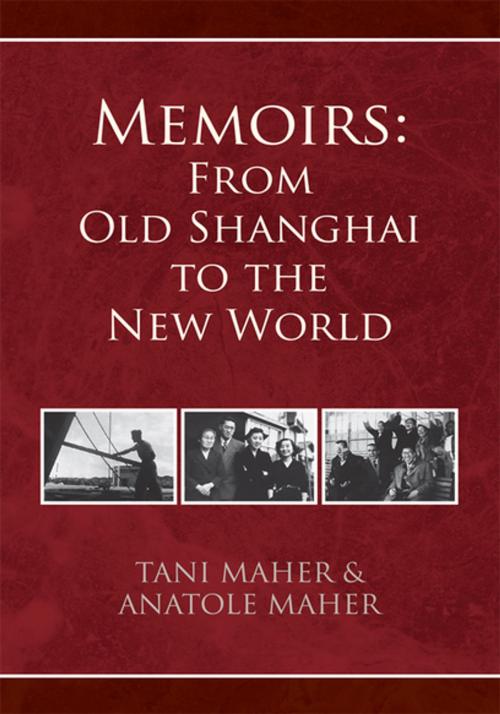| Author: | Anatole Maher, Tani Maher | ISBN: | 9781469119144 |
| Publisher: | Xlibris US | Publication: | June 4, 2008 |
| Imprint: | Xlibris US | Language: | English |
| Author: | Anatole Maher, Tani Maher |
| ISBN: | 9781469119144 |
| Publisher: | Xlibris US |
| Publication: | June 4, 2008 |
| Imprint: | Xlibris US |
| Language: | English |
In the U.S.A, the land of immigrants, Where do you come from? is often asked. When Tani Maher couldnt answer questions about her father, she posed her own. With its South American twist, told with puns and witty tales, Anatole Mahers Memoirs takes the reader on his personal voyage through life where he witnesses many of the major historical events of the 20th century.
During the high-flying, war-torn epoch of Old Shanghai, into a cocktail of languages, culture and people, Anatole Maher is born. While the British toast the Queen at the exclusive Shanghai Club, the French hold soires at the Crcle Sportif Franais, and other foreigners sashay through Shanghais numerous ballrooms, the Chinese are often treated like third-class citizens. The Japanese want to conquer all of Asia, but the Americans intervene until Maos revolution overruns China, putting a stop to everything.
In Memoirs: From Old Shanghai to the New World, Anatole Maher relates his early years in the Pearl of the Orient, a city where strong racial and social lines separate people, the pure bloods from the locals and mixed races, the rich and powerful from the lower, poorer classes. The youngest of seven children whose parents are of Macanese-Japanese descent, Anatole grows up in the culturally diverse International Settlement under the over-protective watch of his eldest sister. Despite the humble, lower-middle class origins of the Mahers, the family have two Amahs and a cook who live with them. Anatole attends the St. Francis Xavier College, becomes an active member of the Foreign YMCA, and graduates with First-Class honors from the Henry Lester Technical Institute. From early on, various battles and wars disrupt his life. His neighborhood in Hongkew is bombarded several times, but Anatole survives the Japanese Occupation and World War II unscathed. After WWII, he works on a Danish freighter ship to see the world. When he returns to China, the Communists are not yet in Shanghai but are winning one battle after another. Anatole finds a job and waits out the situation until the Communists finally kick him out. Japan is the closest country to take in him and his family. After a short stay in Tokyo, Anatole finds a job, but under the American Occupation all the privileges he once enjoyed in his native Shanghai vanish. In search of a better existence, he decides to join many of his Shanghai buddies who have immigrated to the country of the future, Brazil. In Rio de Janeiro, he marries a Brazilian girl in 1955 and starts a family. His record of quitting jobs is no asset. When the Brazilian military dictatorship becomes increasingly oppressive, he runs into bad luck and gets fired. Under a politically repressive regime, with unstable personal finances, Anatole decides to abandon Brazil in 1967 for the Vietnam-War-fatigued United States.
He settles in Jacksonville, Florida, a city with many geographical and climatic similarities to his birthplace Shanghai. As if to compensate for changing jobs and residences so often in the past, he remains at his first job in the U.S., Maxwell House Coffee, for 20 years until his retirement and never again moves from Jacksonville. With 16 grandchildren and six great grandchildren, Anatole and his wife Nair are still enjoying their retirement in the Sunshine State.
In the U.S.A, the land of immigrants, Where do you come from? is often asked. When Tani Maher couldnt answer questions about her father, she posed her own. With its South American twist, told with puns and witty tales, Anatole Mahers Memoirs takes the reader on his personal voyage through life where he witnesses many of the major historical events of the 20th century.
During the high-flying, war-torn epoch of Old Shanghai, into a cocktail of languages, culture and people, Anatole Maher is born. While the British toast the Queen at the exclusive Shanghai Club, the French hold soires at the Crcle Sportif Franais, and other foreigners sashay through Shanghais numerous ballrooms, the Chinese are often treated like third-class citizens. The Japanese want to conquer all of Asia, but the Americans intervene until Maos revolution overruns China, putting a stop to everything.
In Memoirs: From Old Shanghai to the New World, Anatole Maher relates his early years in the Pearl of the Orient, a city where strong racial and social lines separate people, the pure bloods from the locals and mixed races, the rich and powerful from the lower, poorer classes. The youngest of seven children whose parents are of Macanese-Japanese descent, Anatole grows up in the culturally diverse International Settlement under the over-protective watch of his eldest sister. Despite the humble, lower-middle class origins of the Mahers, the family have two Amahs and a cook who live with them. Anatole attends the St. Francis Xavier College, becomes an active member of the Foreign YMCA, and graduates with First-Class honors from the Henry Lester Technical Institute. From early on, various battles and wars disrupt his life. His neighborhood in Hongkew is bombarded several times, but Anatole survives the Japanese Occupation and World War II unscathed. After WWII, he works on a Danish freighter ship to see the world. When he returns to China, the Communists are not yet in Shanghai but are winning one battle after another. Anatole finds a job and waits out the situation until the Communists finally kick him out. Japan is the closest country to take in him and his family. After a short stay in Tokyo, Anatole finds a job, but under the American Occupation all the privileges he once enjoyed in his native Shanghai vanish. In search of a better existence, he decides to join many of his Shanghai buddies who have immigrated to the country of the future, Brazil. In Rio de Janeiro, he marries a Brazilian girl in 1955 and starts a family. His record of quitting jobs is no asset. When the Brazilian military dictatorship becomes increasingly oppressive, he runs into bad luck and gets fired. Under a politically repressive regime, with unstable personal finances, Anatole decides to abandon Brazil in 1967 for the Vietnam-War-fatigued United States.
He settles in Jacksonville, Florida, a city with many geographical and climatic similarities to his birthplace Shanghai. As if to compensate for changing jobs and residences so often in the past, he remains at his first job in the U.S., Maxwell House Coffee, for 20 years until his retirement and never again moves from Jacksonville. With 16 grandchildren and six great grandchildren, Anatole and his wife Nair are still enjoying their retirement in the Sunshine State.















